Dietary Supplement Health and Education Act of 1994(美国膳食补充剂健康与教育法)
美国FDA的《植物药研制指导原则》
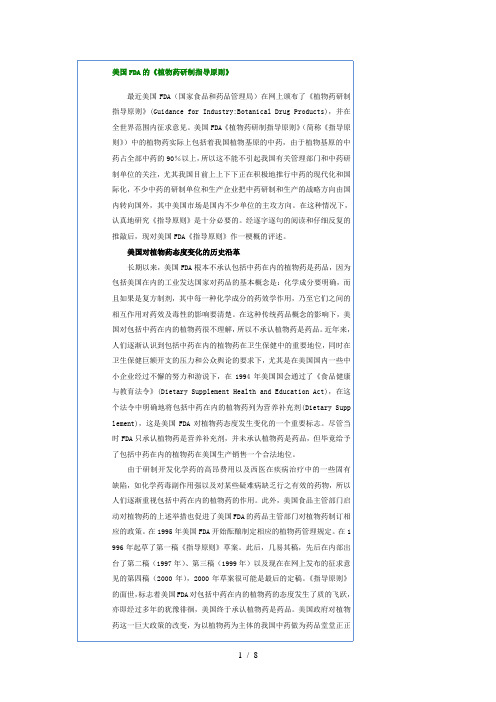
美国FDA的《植物药研制指导原则》最近美国FDA(国家食品和药品管理局)在网上颁布了《植物药研制指导原则》(Guidance for Industry:Botanical Drug Products),并在全世界范围内征求意见。
美国FDA《植物药研制指导原则》(简称《指导原则》)中的植物药实际上包括着我国植物基原的中药,由于植物基原的中药占全部中药的90%以上,所以这不能不引起我国有关管理部门和中药研制单位的关注,尤其我国目前上上下下正在积极地推行中药的现代化和国际化,不少中药的研制单位和生产企业把中药研制和生产的战略方向由国内转向国外,其中美国市场是国内不少单位的主攻方向。
在这种情况下,认真地研究《指导原则》是十分必要的。
经逐字逐句的阅读和仔细反复的推敲后,现对美国FDA《指导原则》作一梗概的评述。
美国对植物药态度变化的历史沿革长期以来,美国FDA根本不承认包括中药在内的植物药是药品,因为包括美国在内的工业发达国家对药品的基本概念是:化学成分要明确,而且如果是复方制剂,其中每一种化学成分的药效学作用,乃至它们之间的相互作用对药效及毒性的影响要清楚。
在这种传统药品概念的影响下,美国对包括中药在内的植物药很不理解,所以不承认植物药是药品。
近年来,人们逐渐认识到包括中药在内的植物药在卫生保健中的重要地位,同时在卫生保健巨额开支的压力和公众舆论的要求下,尤其是在美国国内一些中小企业经过不懈的努力和游说下,在1994年美国国会通过了《食品健康与教育法令》(Dietary Supplement Health and Education Act),在这个法令中明确地将包括中药在内的植物药列为营养补充剂(Dietary Supp lement),这是美国FDA对植物药态度发生变化的一个重要标志。
尽管当时FDA只承认植物药是营养补充剂,并未承认植物药是药品,但毕竟给予了包括中药在内的植物药在美国生产销售一个合法地位。
美国FDA的《植物药研制指导原则》评析

美国FDA的《植物药研制指导原则》评析(作者不详)2004年,美国FDA(国家食品和药品管理局)在网上颁布了《植物药研制指导原则》(Guidance for Industry Botanical Drug Products),并在全世界范围内征求意见。
美国FDA《植物药研制指导原则》(简称《指导原则》)中的植物药实际上包括着我国植物基原的中药,由于植物基原的中药占全部中药的90%以上,所以这不能不引起我国有关管理部门和中药研制单位的关注,尤其我国目前上上下下正在积极地推行中药的现代化和国际化,不少中药的研制单位和生产企业把中药研制和生产的战略方向由国内转向国外,其中美国市场是国内不少单位的主攻方向。
在这种情况下,认真地研究《指导原则》是十分必要的。
经逐字逐句的阅读和仔细反复的推敲后,现对美国FDA《指导原则》作一梗概的评述。
一、美国对植物药态度变化的历史沿革:长期以来,美国FDA根本不承认包括中药在内的植物药是药品,因为包括美国在内的工业发达国家对药品的基本概念是:化学成分要明确,而且如果是复方制剂,其中每一种化学成分的药效学作用,乃至它们之间的相互作用对药效及毒性的影响要清楚。
在这种传统药品概念的影响下,美国对包括中药在内的植物药很不理解,所以不承认植物药是药品。
近年来,人们逐渐认识到包括中药在内的植物药在卫生保健中的重要地位,同时在卫生保健巨额开支的压力和公众舆论的要求下,尤其是在美国国内一些中小企业经过不懈的努力和游说下,在1994年美国国会通过了《食品健康与教育法令》(Dietary Supplement Health and Education Act),在这个法令中明确地将包括中药在内的植物药列为营养补充剂(Dietary Supplement),这是美国FDA对植物药态度发生变化的一个重要标志。
尽管当时FDA只承认植物药是营养补充剂,并未承认植物药是药品,但毕竟给予了包括中药在内的植物药在美国生产销售一个合法地位。
药品注册用英语
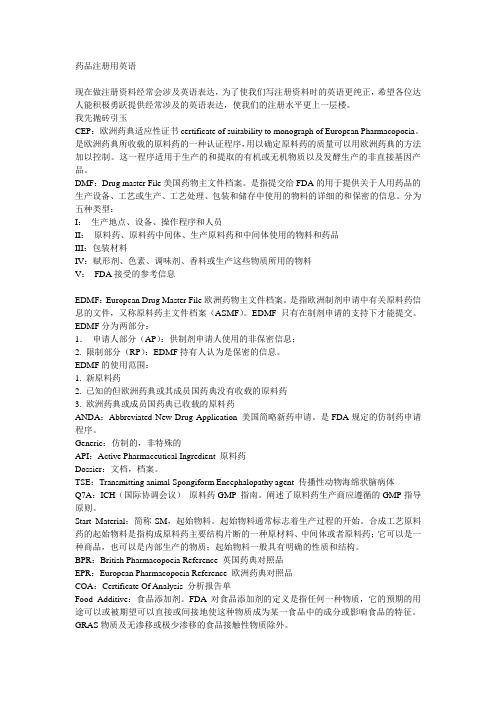
药品注册用英语现在做注册资料经常会涉及英语表达,为了使我们写注册资料时的英语更纯正,希望各位达人能积极勇跃提供经常涉及的英语表达,使我们的注册水平更上一层楼。
我先抛砖引玉CEP:欧洲药典适应性证书certificate of suitability to monograph of European Pharmacopoeia。
是欧洲药典所收载的原料药的一种认证程序,用以确定原料药的质量可以用欧洲药典的方法加以控制。
这一程序适用于生产的和提取的有机或无机物质以及发酵生产的非直接基因产品。
DMF:Drug master File美国药物主文件档案。
是指提交给FDA的用于提供关于人用药品的生产设备、工艺或生产、工艺处理、包装和储存中使用的物料的详细的和保密的信息。
分为五种类型:I:生产地点、设备、操作程序和人员II:原料药、原料药中间体、生产原料药和中间体使用的物料和药品III:包装材料IV:赋形剂、色素、调味剂、香料或生产这些物质所用的物料V:FDA接受的参考信息EDMF:European Drug Master File欧洲药物主文件档案。
是指欧洲制剂申请中有关原料药信息的文件,又称原料药主文件档案(ASMF)。
EDMF 只有在制剂申请的支持下才能提交。
EDMF分为两部分:1.申请人部分(AP):供制剂申请人使用的非保密信息;2. 限制部分(RP):EDMF持有人认为是保密的信息。
EDMF的使用范围:1. 新原料药2. 已知的但欧洲药典或其成员国药典没有收载的原料药3. 欧洲药典或成员国药典已收载的原料药ANDA:Abbreviated New Drug Application 美国简略新药申请。
是FDA规定的仿制药申请程序。
Generic:仿制的,非特殊的API:Active Pharmaceutical Ingredient 原料药Dossier:文档,档案。
TSE:Transmitting animal Spongiform Encephalopathy agent 传播性动物海绵状脑病体Q7A:ICH(国际协调会议)原料药GMP 指南。
药品注册用英语

药品注册用英语现在做注册资料经常会涉及英语表达,为了使我们写注册资料时的英语更纯正,希望各位达人能积极勇跃提供经常涉及的英语表达,使我们的注册水平更上一层楼。
我先抛砖引玉CEP:欧洲药典适应性证书certificate of suitabilityto monograph ofEuropean Pharmacopoeia。
是欧洲药典所收载的原料药的一种认证程序,用以确定原料药的质量可以用欧洲药典的方法加以控制。
这一程序适用于生产的和提取的有机或无机物质以及发酵生产的非直接基因产品。
DMF:Drugmaster File美国药物主文件档案。
是指提交给FDA的用于提供关于人用药品的生产设备、工艺或生产、工艺处理、包装和储存中使用的物料的详细的和保密的信息。
分为五种类型:I:生产地点、设备、操作程序和人员II: 原料药、原料药中间体、生产原料药和中间体使用的物料和药品III:包装材料IV:赋形剂、色素、调味剂、香料或生产这些物质所用的物料V:FDA接受的参考信息EDMF:European Drug MasterFile欧洲药物主文件档案。
是指欧洲制剂申请中有关原料药信息的文件,又称原料药主文件档案(ASMF)。
EDMF 只有在制剂申请的支持下才能提交。
EDMF分为两部分:1. 申请人部分(AP):供制剂申请人使用的非保密信息;2. 限制部分(RP):EDMF持有人认为是保密的信息。
EDMF的使用范围:1. 新原料药2. 已知的但欧洲药典或其成员国药典没有收载的原料药3. 欧洲药典或成员国药典已收载的原料药ANDA:Abbreviated New Drug Application美国简略新药申请。
是FDA规定的仿制药申请程序。
Generic:仿制的,非特殊的API:ActivePharmaceutical Ingredient原料药Dossier:文档,档案。
TSE:Transmittinganimal SpongiformEncephalopathy agent传播性动物海绵状脑病体Q7A:ICH(国际协调会议) 原料药GMP 指南。
如何以_膳食补充剂_的名义角逐美国市场_医保商会中药部
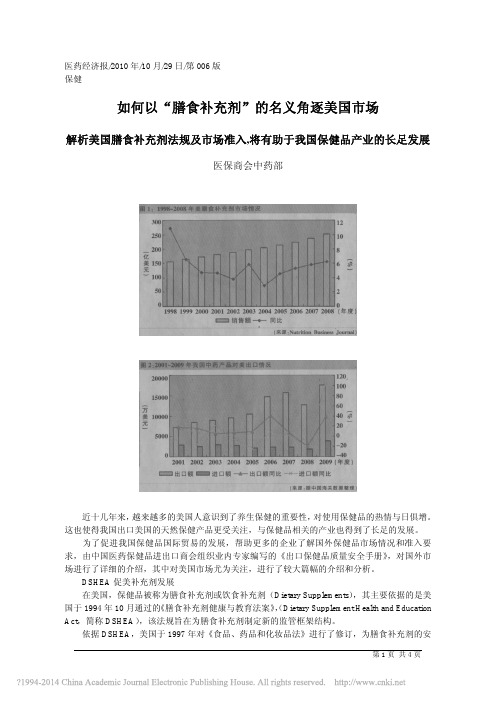
医药经济报/2010年/10月/29日/第006版保健如何以“膳食补充剂”的名义角逐美国市场解析美国膳食补充剂法规及市场准入,将有助于我国保健品产业的长足发展医保商会中药部近十几年来,越来越多的美国人意识到了养生保健的重要性,对使用保健品的热情与日俱增。
这也使得我国出口美国的天然保健产品更受关注,与保健品相关的产业也得到了长足的发展。
为了促进我国保健品国际贸易的发展,帮助更多的企业了解国外保健品市场情况和准入要求,由中国医药保健品进出口商会组织业内专家编写的《出口保健品质量安全手册》,对国外市场进行了详细的介绍,其中对美国市场尤为关注,进行了较大篇幅的介绍和分析。
DSHEA促美补充剂发展在美国,保健品被称为膳食补充剂或饮食补充剂(Dietary Supplements),其主要依据的是美国于1994年10月通过的《膳食补充剂健康与教育法案》,(Dietary Supplement Health and Education Act,简称DSHEA),该法规旨在为膳食补充剂制定新的监管框架结构。
依据DSHEA,美国于1997年对《食品、药品和化妆品法》进行了修订,为膳食补充剂的安全和标签管理创造了一个新的体制,从根本上改变了FDA监管饮食补充剂的方式。
DSHEA澄清了以前膳食补充剂概念不清的属性,明确建立于归属于食品大类下的小类“膳食补充剂”,产品扩大到除维生素、矿物质、蛋白质以外的其他多种植物产品(包括植物提取物及相关产品),并允许多成分的组合膳食补充剂产品。
这一条款对膳食补充剂制造业有着不可估量的重大影响。
DSHEA从成分、剂型、功效、标签等几个方面对膳食补充剂进行了规定。
成分包括:维生素、矿物质、草药或其他植物、氨基酸、可以使人增加饮食摄入量的膳食成分(如酶、动物器官组织、腺体等),或上述成分的浓缩物、代谢物、结构成分、提取物,或上述成分的组合成分;明确了“不能代替传统食品使用,或不能作为一日三餐中唯一的饮食”,并可能包括一些新批准的药品、抗生素或生物制品(主要指在FDA批准该新药、新抗生素或新生物制品上市前,已作为膳食补充剂或食品在美国合法上市的那一类产品)。
FDA术语表
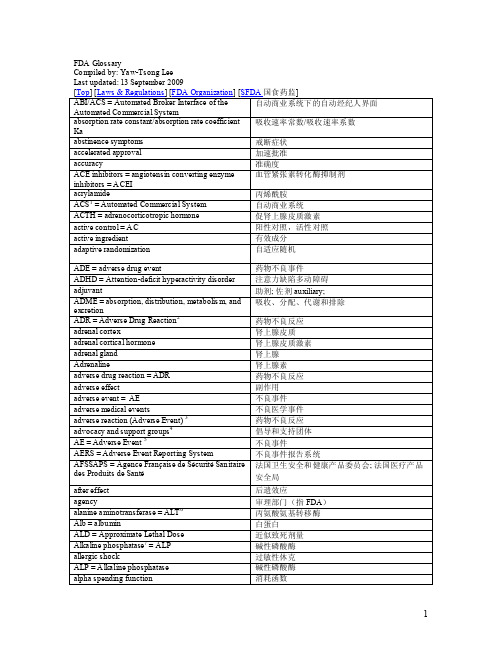
FDA GlossaryCompiled by: Yaw-Tsong Lee Last updated: 13 September 2009[Top] [Laws & Regulations] [FDA Organization] [SFDA][Top] [Laws & Regulations] [FDA Organization] [SFDA]FDA Organization Charts[Top] [Laws & Regulations] [FDA Organization] [SFDA][Top] [Laws & Regulations] [FDA Organization] [SFDA]1 of the Bureau of Customs and Border Protection (CBP)2 An unintended reaction to a drug taken at doses normally used in man for prophylaxis, diagnosis, or therapy of disease, or for the modification of physiological function. In clinical trials, an ADR would include any injuries by overdosing, abuse/dependence, and unintended interactions with other medicinal products.3 An unwanted effect caused by the administration of drugs. Onset may be sudden or develop over time4 Organizations and groups that actively support participants and their families with valuable resources, including self-empowerment and survival tools.5 A negative experience encountered by an individual during the course of a clinical trial that is associated with the drug.6 An alanine aminotransferase (ALT) test measures the amount of this enzyme in the blood. ALT is measured to see if the liver is damaged or diseased.7 to check for liver disease or damage to the liver. Symptoms of liver disease can include jaundice, belly pain, nausea, and vomiting. An ALP test may also be used to check the liver when medicines that can damage the liver are taken or to check bone problems (sometimes found on X-rays), such as rickets, osteomalacia, bone tumors, Paget's disease, or too much of the hormone that controls bone growth (parathyroid hormone).8 Any of the treatment groups in a randomized trial.9 Low levels of AST are normally found in the blood. When body tissue or an organ such as the heart or liver is diseased or damaged, additional AST is released into the bloodstream. The amount of AST in the blood is directly related to the extent of the tissue damage.10 A renewable permit granted by the federal government to an institution or research center to conduct clinical trials.11 Benzodiazepines have also been used as a "date rape" drug because they can markedly impair and even abolish functions that normally allow a person to resist or even want to resist sexual aggression or assault12本类药物也称弱安定药,包括氯氮卓(利眠宁,chlordiazepoxide,商品名Librium)、地西泮(安定,diazepam,商品名valium)、硝西泮(硝基安定,nitrazepam)、氟西泮(氟安定,flurazepam)及奥沙西泮(去甲羟基安定,舒宁,oxazepam)。
美国膳食营养补充品监管
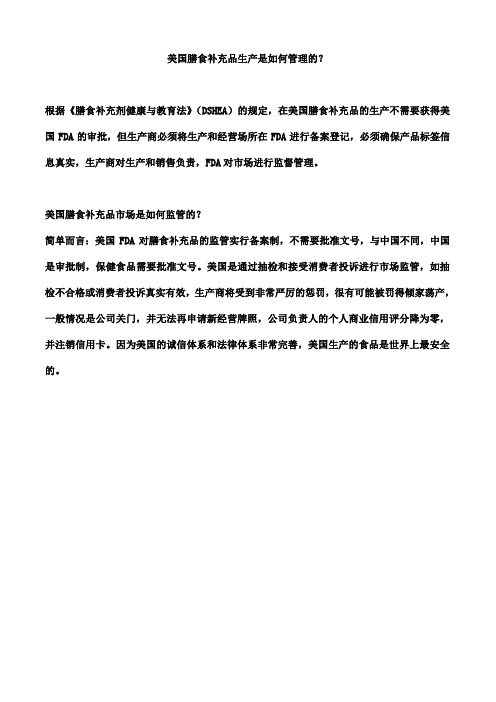
美国膳食补充品生产是如何管理的?
根据《膳食补充剂健康与教育法》(DSHEA)的规定,在美国膳食补充品的生产不需要获得美国FDA的审批,但生产商必须将生产和经营场所在FDA进行备案登记,必须确保产品标签信息真实,生产商对生产和销售负责,FDA对市场进行监督管理。
美国膳食补充品市场是如何监管的?
简单而言:美国FDA对膳食补充品的监管实行备案制,不需要批准文号,与中国不同,中国是审批制,保健食品需要批准文号。
美国是通过抽检和接受消费者投诉进行市场监管,如抽检不合格或消费者投诉真实有效,生产商将受到非常严厉的惩罚,很有可能被罚得倾家荡产,一般情况是公司关门,并无法再申请新经营牌照,公司负责人的个人商业信用评分降为零,并注销信用卡。
因为美国的诚信体系和法律体系非常完善,美国生产的食品是世界上最安全的。
中药作为植物药和食品补充剂在美国的现状 Jinhui Dou, PhD

CFSAN)
• 化妆品 ted with Aspose.Slides for .NET 3.5 Client Profile 5.2 • 药品 (药品评价和研究中心 CDER) Copyright 2004-2011 Aspose Pty Ltd. • 医疗器械 (器械和放射卫生中心 CDRH) • 动物饲料和药品 (兽用药品中心 CVM)
2008年11月6-7日 中国 天津
演讲纲要
作为美国FDA管制产品的植物药
Evaluation only. 植物药品指南 ted with Aspose.Slides for .NET 3.5 Client Profile 5.2 • 研究性新药申请审核(INA) 2004-2011 Aspose Pty Ltd. • Copyright 有关植物药的新药申请审核和特定事项(NDA)
即使传统东方医药使用的配方中包括已使用的食品补充剂 成分(香料, 草药, 维生素, 蛋白质, 矿物质, 等.), 但如果在产 品标签上宣称有疾病治疗效果, 那么产品也将被认为是药品. Evaluation only. 这样的疾病治疗效果可以是标签上宣称 , 或隐含表达, 如通 过互联网宣称等 . with Aspose.Slides for .NET 3.5 Client Profile 如果传统东方医药是作为食品补充剂上市和标签说明的话, Copyright 2004-2011 Aspose Pty Ltd. 它就必须符合食品补充剂健康教育法案 (DSHEA--Dietary Supplement Health and Education Act of 1994).
“该声明没有经过FDA评估. Evaluation only. 本产品不能针对 , 治疗 , 治愈和预防疾 ted with病” Aspose.Slides for .NET 3.5 Client Profile 5.2 Copyright 2004-2011 Aspose Pty Ltd.
- 1、下载文档前请自行甄别文档内容的完整性,平台不提供额外的编辑、内容补充、找答案等附加服务。
- 2、"仅部分预览"的文档,不可在线预览部分如存在完整性等问题,可反馈申请退款(可完整预览的文档不适用该条件!)。
- 3、如文档侵犯您的权益,请联系客服反馈,我们会尽快为您处理(人工客服工作时间:9:00-18:30)。
Dietary Supplement Health and Education Act of 1994An ActTo amend the Federal Food, Drug, and Cosmetic Act to establish standards with respect to dietary supplements, and for other purposes.Be it enacted by the Senate and House of Representatives of the United States of America in Congress assembled,§1. Short Title; Reference; Table Of Contents.∙(a) Short Title.This Act may be cited as the "Dietary Supplement Health and Education Act of 1994".∙(b) Reference.Whenever in this Act an amendment or repeal is expressed in terms of an amendment to, or repeal of, a section or other provision, the reference shall be considered to be made to a section or other provision of the Federal Food, Drug, and Cosmetic Act.∙(c) Table of Contents.The table of contents of this Act is as follows:Sec. 1.Short title; reference; table of contents.Sec. 2.Findings.Sec. 3.Definitions.Sec. 4.Safety of dietary supplements and burden of proof on FDA.Sec. 5. Dietary supplement claims.Sec. 6.Statements of nutritional support.Sec. 7.Dietary supplement ingredient labeling and nutrition information labeling.Sec. 8.New dietary ingredients.Sec. 9. Good manufacturing practices.Sec. 10.Conforming amendments.Sec. 11.Withdrawal of the regulations and notice.Sec. mission on dietary supplement labels.Sec. 13.Office of dietary supplements.§2. Findings.Congress finds that -∙(1) improving the health status of United States citizens ranks at the top of the national priorities of the Federal Government;∙(2) the importance of nutrition and the benefits of dietary supplements to health promotion and disease prevention have been documented increasingly in scientific studies;∙(3)(A) there is a link between the ingestion of certain nutrients or dietary supplements and the prevention of chronic diseases such as cancer, heart disease, and osteoporosis; and∙(B) clinical research has shown that several chronic diseases can be prevented simply with a healthful diet, such as a diet that is low in fat, saturated fat, cholesterol, and sodium, with a high proportion of plant-based foods;∙(4) healthful diets may mitigate the need for expensive medical procedures, such as coronary bypass surgery or angioplasty;∙(5) preventive health measures, including education, good nutrition, and appropriate use of safe nutritional supplements will limit the incidence of chronic diseases, and reduce long-termhealth care expenditures;∙(6)(A) promotion of good health and healthy lifestyles improves and extends lives while reducing health care expenditures; and ∙(B) reduction in health care expenditures is of paramount importance to the future of the country and the economic well-being of the country;∙(7) there is a growing need for emphasis on the dissemination of information linking nutrition and long-term good health;∙(8) consumers should be empowered to make choices about preventive health care programs based on data from scientific studies of health benefits related to particular dietary supplements;∙(9) national surveys have revealed that almost 50 percent of the 260,000,000 Americans regularly consume dietary supplements ofvitamins, minerals, or herbs as a means of improving theirnutrition;∙(10) studies indicate that consumers are placing increased reliance on the use of nontraditional health care providers to avoid theexcessive costs of traditional medical services and to obtain more holistic consideration of their needs;∙(11) the United States will spend over $1,000,000,000,000 on health care in 1994, which is about 12 percent of the Gross National Product of the United States, and this amount and percentage will continue to increase unless significant efforts are undertaken to reverse the increase;∙(12)(A) the nutritional supplement industry is an integral part of the economy of the United States;∙(B) the industry consistently projects a positive trade balance;and∙(C) the estimated 600 dietary supplement manufacturers in the United States produce approximately 4,000 products, with totalannual sales of such products alone reaching at least$4,000,000,000;∙(13) although the Federal Government should take swift action against products that are unsafe or adulterated, the FederalGovernment should not take any actions to impose unreasonableregulatory barriers limiting or slowing the flow of safe products and accurate information to consumers;∙(14) dietary supplements are safe within a broad range of intake, and safety problems with the supplements are relatively rare; and ∙(15)(A) legislative action that protects the right of access of consumers to safe dietary supplements is necessary in order topromote wellness; and∙(B) a rational Federal framework must be established to supersede the current ad hoc, patchwork regulatory policy on dietarysupplements.§3. Definitions.∙(a) Definition of Certain Foods as Dietary Supplements. Section 201 (21 U.S.C. 321) is amended by adding at the end the following: "(ff) The term "dietary supplement" -o"(1) means a product (other than tobacco) intended to supplement the diet that bears or contains one or more of the following dietary ingredients:▪"(A) a vitamin;▪"(B) a mineral;▪"(C) an herb or other botanical;▪"(D) an amino acid;▪"(E) a dietary substance for use by man to supplement the diet by increasing the total dietary intake; or ▪"(F) a concentrate, metabolite, constituent, extract, or combination of any ingredient described in clause(A), (B), (C), (D), or (E);o"(2) means a product that -▪"(A)(i) is intended for ingestion in a form described in section 411(c)(1)(B)(i); or▪"(ii) complies with section 411(c)(1)(B)(ii);▪"(B) is not represented for use as a conventional food or as a sole item of a meal or the diet; and ▪"(C) is labeled as a dietary supplement; and o"(3) does -▪"(A) include an article that is approved as a new drug under section 505, certified as an antibiotic undersection 507, or licensed as a biologic under section351 of the Public Health Service Act (42 U.S.C. 262)and was, prior to such approval, certification, orlicense, marketed as a dietary supplement or as a foodunless the Secretary has issued a regulation, afternotice and comment, finding that the article, when usedas or in a dietary supplement under the conditions ofuse and dosages set forth in the labeling for suchdietary supplement, is unlawful under section 402(f);and▪"(B) not include -▪"(i) an article that is approved as a new drugunder section 505, certified as an antibioticunder section 507, or licensed as a biologicunder section 351 of the Public Health ServiceAct (42 U.S.C. 262), or▪"(ii) an article authorized for investigation asa new drug, antibiotic, or biological for whichsubstantial clinical investigations have beeninstituted and for which the existence of suchinvestigations has been made public,which was not before such approval, certification, licensing, or authorization marketed as a dietary supplement or as a food unless the Secretary, in the Secretary's discretion, has issued aregulation, after notice and comment, finding that the articlewould be lawful under this Act.Except for purposes of section 201(g), a dietary supplement shall be deemed to be a food within the meaning of this Act.∙∙(b) Exclusion from Definition of Food Additive.Section 201(s) (21 U.S.C. 321(s)) is amended -o(1) by striking "or" at the end of subparagraph (4);o(2) by striking the period at the end of subparagraph (5) and inserting "; or"; ando(3) by adding at the end the following new subparagraph (6) "an ingredient described in paragraph (ff) in, or intendedfor use in, a dietary supplement.".∙(c) Form of Ingestion.Section 411(c)(1)(B) (21 U.S.C. 350(c)(1)(B)) is amended -o(1) in clause (i), by inserting "powder, softgel, gelcap,"after "capsule,"; ando(2) in clause (ii), by striking "does not simulate and".§4. Safety of Dietary Supplements and Burden of Proof on FDA.Section 402 (21 U.S.C. 342) is amended by adding at the end the following: ∙"(f)(1) If it is a dietary supplement or contains a dietary ingredient that -o"(A) presents a significant or unreasonable risk of illness or injury under -▪"(i) conditions of use recommended or suggested inlabeling, or▪"(ii) if no conditions of use are suggested orrecommended in the labeling, under ordinary conditionsof use;o"(B) is a new dietary ingredient for which there is inadequate information to provide reasonable assurance that suchingredient does not present a significant or unreasonablerisk of illness or injury;o"(C) the Secretary declares to pose an imminent hazard to public health or safety, except that the authority to makesuch declaration shall not be delegated and the Secretaryshall promptly after such a declaration initiate a proceedingin accordance with sections 554 and 556 of title 5, UnitedStates Code, to affirm or withdraw the declaration; or o"(D) is or contains a dietary ingredient that renders it adulterated under paragraph (a)(1) under the conditions ofuse recommended or suggested in the labeling of such dietarysupplement.In any proceeding under this subparagraph, the United States shall bear the burden of proof on each element to show that a dietary supplement is adulterated. The court shall decide any issue under this paragraph on a de novo basis.∙(2) Before the Secretary may report to a United States attorney a violation of paragraph (1)(A) for a civil proceeding, the person against whom such proceeding would be initiated shall be givenappropriate notice and the opportunity to present views, orally and in writing, at least 10 days before such notice, with regard to such proceeding.§5. Dietary Supplement Claims.Chapter IV (21 U.S.C. 341 et seq.) is amended by inserting after section 403A the following new section:DIETARY SUPPLEMENT LABELING EXEMPTIONS∙"Sec. 403B. (a) IN GENERAL.- A publication, including an article,a chapter in a book, or an official abstract of a peer-reviewedscientific publication that appears in an article and was prepared by the author or the editors of the publication, which is reprinted in its entirety, shall not be defined as labeling when used inconnection with the sale of a dietary supplement to consumers when it -o"(1) is not false or misleading;o"(2) does not promote a particular manufacturer or brand ofa dietary supplement;o"(3) is displayed or presented, or is displayed or presented with other such items on the same subject matter, so as topresent a balanced view of the available scientificinformation on a dietary supplement;o"(4) if displayed in an establishment, is physically separate from the dietary supplements; ando"(5) does not have appended to it any information by sticker or any other method.∙"(b) APPLICATION. - Subsection (a) shall not apply to or restricta retailer or wholesaler of dietary supplements in any waywhatsoever in the sale of books or other publications as a part of the business of such retailer or wholesaler.∙"(c) BURDEN OF PROOF. -In any proceeding brought under subsection(a), the burden of proof shall be on the United States to establishthat an article or other such matter is false or misleading.". §6. Statements of Nutritional Support.Section 403(r) (21 U.S.C. 343(r)) is amended by adding at the end the following:∙"(6) For purposes of paragraph (r)(1)(B), a statement for a dietary supplement may be made if -o"(A) the statement claims a benefit related to a classical nutrient deficiency disease and discloses the prevalence ofsuch disease in the United States, describes the role of anutrient or dietary ingredient intended to affect thestructure or function in humans, characterizes thedocumented mechanism by which a nutrient or dietaryingredient acts to maintain such structure or function, ordescribes general well-being from consumption of a nutrientor dietary ingredient,o"(B) the manufacturer of the dietary supplement hassubstantiation that such statement is truthful and notmisleading, ando"(C) the statement contains, prominently displayed and in boldface type, the following: "This statement has not beenevaluated by the Food and Drug Administration. This productis not intended to diagnose, treat, cure, or prevent anydisease.".A statement under this subparagraph may not claim to diagnose,mitigate, treat, cure, or prevent a specific disease or class of diseases. If the manufacturer of a dietary supplement proposes to make a statement described in the first sentence of thissubparagraph in the labeling of the dietary supplement, themanufacturer shall notify the Secretary no later than 30 days after the first marketing of the dietary supplement with such statement that such a statement is being made.".§7. Dietary Supplement Ingredient Labeling and Nutrition Information Labeling.(a) MISBRANDED SUPPLEMENTS. -Section 403 (21 U.S.C. 343) is amendedby adding at the end the following: "(s) If -o"(1) it is a dietary supplement; ando"(2)(A) the label or labeling of the supplement fails to list -▪"(i) the name of each ingredient of the supplement thatis described in section 201(ff); and▪"(ii)(I) the quantity of each such ingredient; or▪"(II) with respect to a proprietary blend of suchingredients, the total quantity of all ingredients inthe blend;o"(B) the label or labeling of the dietary supplement fails to identify the product by using the term `dietarysupplement', which term may be modified with the name of suchan ingredient;o"(C) the supplement contains an ingredient described in section 201(ff)(1)(C), and the label or labeling of thesupplement fails to identify any part of the plant from whichthe ingredient is derived;o"(D) the supplement -▪"(i) is covered by the specifications of an officialcompendium;▪"(ii) is represented as conforming to thespecifications of an official compendium; and▪"(iii) fails to so conform; oro"(E) the supplement -▪"(i) is not covered by the specifications of anofficial compendium; and▪"(ii)(I) fails to have the identity and strength that the supplement is represented to have; or▪"(II) fails to meet the quality (including tablet or capsule disintegration), purity, or compositionalspecifications, based on validated assay or otherappropriate methods, that the supplement isrepresented to meet.".(b) Supplement Listing on Nutrition Labeling.Section 403(q)(5)(F)(21 U.S.C. 343(q)(5)(F)) is amended to read as follows:o"(F) A dietary supplement product (including a food to which section 411 applies) shall comply with the requirements ofsubparagraphs (1) and (2) in a manner which is appropriatefor the product and which is specified in regulations of theSecretary which shall provide that -▪"(i) nutrition information shall first list thosedietary ingredients that are present in the product ina significant amount and for which a recommendation fordaily consumption has been established by theSecretary, except that a dietary ingredient shall notbe required to be listed if it is not present in asignificant amount, and shall list any other dietaryingredient present and identified as having no suchrecommendation;▪"(ii) the listing of dietary ingredients shall include the quantity of each such ingredient (or of aproprietary blend of such ingredients) per serving;▪"(iii) the listing of dietary ingredients may include the source of a dietary ingredient; and▪"(iv) the nutrition information shall immediatelyprecede the ingredient information required undersubclause (i), except that no ingredient identifiedpursuant to subclause (i) shall be required to beidentified a second time.".∙(c) Percentage Level Claims.Section 403(r)(2) (21 U.S.C. 343(r)(2)) is amended by adding after clause (E) the following:o"(F) Subclause (i) clause (A) does not apply to a statement in the labeling of a dietary supplement that characterizesthe percentage level of a dietary ingredient for which theSecretary has not established a reference daily intake, dailyrecommended value, or other recommendation for dailyconsumption.".∙(d) Vitamins and Minerals.Section 411(b)(2) (21 U.S.C. 350(b)(2)) is amended -o(1) by striking "vitamins or minerals" and inserting "dietary supplement ingredients described in section 201(ff)";o(2) by striking "(2)(A)" and inserting "(2)"; ando(3) by striking subparagraph (B).∙(e) Effective Date. Dietary supplements -o(1) may be labeled after the date of the enactment of this Act in accordance with the amendments made by this section,ando(2) shall be labeled after December 31, 1996, in accordance with such amendments.§8. New Dietary Ingredients.Chapter IV of the Federal Food, Drug, and Cosmetic Act is amended by adding at the end the following:"NEW DIETARY INGREDIENTS∙"SEC. 413. (a) IN GENERAL.- A dietary supplement which contains a new dietary ingredient shall be deemed adulterated under section 402(f) unless it meets one of the following requirements:o"(1) The dietary supplement contains only dietaryingredients which have been present in the food supply as anarticle used for food in a form in which the food has not beenchemically altered.o"(2) There is a history of use or other evidence of safety establishing that the dietary ingredient when used under theconditions recommended or suggested in the labeling of thedietary supplement will reasonably be expected to be safe and,at least 75 days before being introduced or delivered forintroduction into interstate commerce, the manufacturer ordistributor of the dietary ingredient or dietary supplementprovides the Secretary with information, including anycitation to published articles, which is the basis on whichthe manufacturer or distributor has concluded that a dietarysupplement containing such dietary ingredient willreasonably be expected to be safe.The Secretary shall keep confidential any information provided under paragraph (2) for 90 days following its receipt. After the expiration of such 90 days, the Secretary shall place suchinformation on public display, except matters in the information which are trade secrets or otherwise confidential, commercial information.∙"(b) PETITION. -Any person may file with the Secretary a petition proposing the issuance of an order prescribing the conditions under which a new dietary ingredient under its intended conditions of use will reasonably be expected to be safe. The Secretary shall makea decision on such petition within 180 days of the date the petitionis filed with the Secretary. For purposes of chapter 7 of title 5, United States Code, the decision of the Secretary shall beconsidered final agency action.∙"(c) DEFINITION. - For purposes of this section, the term "new dietary ingredient" means a dietary ingredient that was notmarketed in the United States before October 15, 1994 and does not include any dietary ingredient which was marketed in the United States before October 15, 1994.".§9. Good Manufacturing Practices.Section 402 (21 U.S.C. 342), as amended by section 4, is amended by adding at the end the following:∙"(g)(1) If it is a dietary supplement and it has been prepared, packed, or held under conditions that do not meet current goodmanufacturing practice regulations, including regulationsrequiring, when necessary, expiration date labeling, issued by the Secretary under subparagraph (2).∙"(2) The Secretary may by regulation prescribe good manufacturing practices for dietary supplements. Such regulations shall bemodeled after current good manufacturing practice regulations for food and may not impose standards for which there is no current and generally available analytical methodology. No standard of current good manufacturing practice may be imposed unless such standard is included in a regulation promulgated after notice and opportunity for comment in accordance with chapter 5 of title 5, United States Code.".§10. Conforming Amendments.∙(a) SECTION 201 -The last sentence of section 201(g)(1) (21 U.S.C.321(g)(1)) is amended to read as follows: "A food or dietarysupplement for which a claim, subject to sections 403(r)(1)(B) and 403(r)(3) or sections 403(r)(1)(B) and 403(r)(5)(D), is made in accordance with the requirements of section 403(r) is not a drug solely because the label or the labeling contains such a claim. A food, dietary ingredient, or dietary supplement for which atruthful and not misleading statement is made in accordance with section 403(r)(6) is not a drug under clause (C) solely because the label or the labeling contains such a statement.".∙(b) SECTION 301 -Section 301 (21 U.S.C. 331) is amended by adding at the end the following: (u) The introduction or delivery forintroduction into interstate commerce of a dietary supplement that is unsafe under section 413.".∙(c) SECTION 403 -Section 403 (21 U.S.C. 343), as amended by section 7, is amended by adding after paragraph (s) the following: "Adietary supplement shall not be deemed misbranded solely because its label or labeling contains directions or conditions of use or warnings.".§11. Withdrawal of th e Regulations and Notice.The advance notice of proposed rulemaking concerning dietary supplements published in the Federal Register of June 18, 1993 (58 FR 33690-33700) is null and void and of no force or effect insofar as it applies to dietary supplements. The Secretary of Health and Human Services shall publish a notice in the Federal Register to revoke the item declared to be null and void and of no force or effect under subsection (a).§12. Commission on Dietary Supplement Labels.∙(a) ESTABLISHMENT. - There shall be established as an independent agency within the executive branch a commission to be known as the Commission on Dietary Supplement Labels (hereafter in this section referred to as the "Commission").∙(b) MEMBERSHIP. -o(1) COMPOSITION. - The Commission shall be composed of 7 members who shall be appointed by the President.o(2) EXPERTISE REQUIREMENT. - The members of the Commission shall consist of individuals with expertise and experiencein dietary supplements and in the manufacture, regulation,distribution, and use of such supplements. At least three ofthe members of the Commission shall be qualified byscientific training and experience to evaluate the benefitsto health of the use of dietary supplements and one of suchthree members shall have experience in pharmacognosy,medical botany, traditional herbal medicine, or otherrelated sciences. Members and staff of the Commission shallbe without bias on the issue of dietary supplements.∙(c) FUNCTIONS OF THE COMMISSION. - The Commission shall conducta study on, and provide recommendations for, the regulation of labelclaims and statements for dietary supplements, including the use of literature in connection with the sale of dietary supplements and procedures for the evaluation of such claims. In making such recommendations, the Commission shall evaluate how best to provide truthful, scientifically valid, and not misleading information to consumers so that such consumers may make informed and appropriate health care choices for themselves and their families.∙(d) ADMINISTRATIVE POWERS OF THE COMMISSION. -o(1) HEARINGS. - The Commission may hold hearings, sit and act at such times and places, take such testimony, and receivesuch evidence as the Commission considers advisable to carryout the purposes of this section.o(2) INFORMATION FROM FEDERAL AGENCIES. - The Commission may secure directly from any Federal department or agency suchinformation as the Commission considers necessary to carryout the provisions of this section.o(3) AUTHORIZATION OF APPROPRIATIONS. - There are authorized to be appropriated such sums as may be necessary to carry outthis section.∙(e) REPORTS AND RECOMMENDATIONS. -o(1) FINAL REPORT REQUIRED. - Not later than 24 months after the date of enactment of this Act, the Commission shallprepare and submit to the President and to the Congress afinal report on the study required by this section.o(2) RECOMMENDATIONS. - The report described in paragraph (1) shall contain such recommendations, includingrecommendations for legislation, as the Commission deemsappropriate.o(3) ACTION ON RECOMMENDATIONS. - Within 90 days of the issuance of the report under paragraph (1), the Secretary ofHealth and Human Services shall publish in the FederalRegister a notice of any recommendation of Commission forchanges in regulations of the Secretary for the regulationof dietary supplements and shall include in such notice anotice of proposed rulemaking on such changes together withan opportunity to present views on such changes. Suchrulemaking shall be completed not later than 2 years afterthe date of the issuance of such report. If such rulemakingis not completed on or before the expiration of such 2 years,regulations of the Secretary published in 59 FR 395-426 onJanuary 4, 1994, shall not be in effect.§13. Office of Dietary Supplements.(a) IN GENERAL. - Title IV of the Public Health Service Act isamended by inserting after section 485B (42 U.S.C. 287c-3) thefollowing:" SUBPART 4--OFFICE OF DIETARY SUPPLEMENTS SEC. 485C. DIETARYSUPPLEMENTS.o"(a) ESTABLISHMENT. -The Secretary shall establish an Office of Dietary Supplements within the National Institutes ofHealth.o"(b) PURPOSE. - The purposes of the Office are -▪"(1) to explore more fully the potential role ofdietary supplements as a significant part of theefforts of the United States to improve health care;and▪"(2) to promote scientific study of the benefits ofdietary supplements in maintaining health andpreventing chronic disease and other health-relatedconditions.o"(c) DUTIES. - The Director of the Office of DietarySupplements shall -▪"(1) conduct and coordinate scientific research within the National Institutes of Health relating to dietarysupplements and the extent to which the use of dietarysupplements can limit or reduce the risk of diseasessuch as heart disease, cancer, birth defects,osteoporosis, cataracts, or prostatism;▪"(2) collect and compile the results of scientific research relating to dietary supplements, includingscientific data from foreign sources or the Office ofAlternative Medicine;▪"(3) serve as the principal advisor to the Secretary and to the Assistant Secretary for Health and provideadvice to the Director of the National Institutes ofHealth, the Director of the Centers for Disease Controland Prevention, and the Commissioner of Food and Drugson issues relating to dietary supplements including - ▪"(A) dietary intake regulations;▪"(B) the safety of dietary supplements;▪"(C) claims characterizing the relationshipbetween -▪"(i) dietary supplements; and▪"(ii)(I) prevention of disease or otherhealth-related conditions; and▪"(II) maintenance of health; and▪"(D) scientific issues arising in connectionwith the labeling and composition of dietarysupplements;▪"(4) compile a database of scientific research on dietary supplements and individual nutrients; and ▪"(5) coordinate funding relating to dietarysupplements for the National Institutes of Health. o"(d) DEFINITION. -As used in this section, the term "dietarysupplement" has the meaning given the term in section 201(ff) of the Federal Food, Drug, and Cosmetic Act.。
